CICD 10th Anniversary and Data Summit
October 8–9, 2025
Livestream event
Federal Reserve Bank of Minneapolis
Minneapolis, Minnesota

On October 8–9, 2025, leaders from across Indian Country, the Federal Reserve System, and beyond gathered to mark the Center for Indian Country Development’s (CICD’s) tenth anniversary and first decade of economic research and data work. This special two-day event featured thought leader reflections on what we’ve learned from the past decade of economic research in Indian Country, economic innovations taking place across Native communities, and future opportunities for advancing the economic prosperity of Indian Country. Tribal and Federal Reserve leaders also explored emerging opportunities related to tribal public finance, access to capital, and economic diversification.
October 8: CICD 10th-Anniversary Event
In honor of CICD’s 10-year milestone, the first day brought together national leaders from Indian Country and the Federal Reserve System, along with others interested in economic prosperity in Indian Country, to share perspectives on the past and future of economic advancements in Native economies. Leading experts reflected on Indian Country’s contributions to the overall economy and the role of research and data in strengthening Native economies for the next seven generations.
October 9: CICD Data Summit
The following day, a special milestone-year edition of CICD’s annual data summit provided the opportunity to take a deeper dive into economic topics of interest. Indian Country thought leaders and economic experts spoke about emerging opportunities for Native communities to leverage economic data to enhance access to capital, diversify revenue, and promote community and economic well-being. The event also introduced tribes across the country to the Survey of Native Nations, a collaboration between CICD and tribal governments to equip tribal leaders with benchmark public finance data.
Speakers:
- Debbie Atuk (Inupiaq, Kingikmiut), Bering Straits Native Corporation Government Services LLC
- Governor Michael Barr, Board of Governors of the Federal Reserve System
- Little Crow Bellecourt (Bad River Chippewa Tribe), Community Member
- Melanie Benjamin (Mille Lacs Band of Ojibwe), Blue Stone Strategy Partners
- Amy Besaw Medford (Brothertown Indian Nation), Project on Indigenous Governance and Development, Harvard University
- Cory Blankenship (Eastern Band of Cherokee Indians), NAFOA
- Kitcki Carroll (Cheyenne and Arapaho Tribes of Oklahoma), United South and Eastern Tribes
- Maranda Compton (Delaware Tribe of Indians), Lepwe Inc.
- Chrystel Cornelius (Oneida Nation of Wisconsin, Turtle Mountain Band of Chippewa), Oweesta Corporation
- Sharon Day (Bois Forte Band of Ojibwe), Community Elder
- Ron Feldman, Federal Reserve Bank of Minneapolis
- Leonard “Lenny” Fineday (Leech Lake Band of Ojibwe), Leech Lake Band of Ojibwe
- Dennis Fitzpatrick (Blackfeet Tribal Nation), Siyeh Corporation, Blackfeet Tribal Nation
- Phil Gover (Northern and Southern Paiute, Pawnee, and Comanche Nations), CICD, Federal Reserve Bank of Minneapolis
- Chairman Gerald Gray (Little Shell Tribe of Chippewa Indians), Little Shell Tribe of Chippewa Indians
- Dawson Her Many Horses (Rosebud Sioux Tribe of South Dakota), Wells Fargo
- Andrew Huff (Chippewa Cree Tribe), CICD, Federal Reserve Bank of Minneapolis
- Chris James (Cherokee), The National Center for American Indian Enterprise Development
- Nancy Jordan, Pacific Northwest Tribal Lending
- Amalea Jubara, CICD, Federal Reserve Bank of Minneapolis
- Neel Kashkari, Federal Reserve Bank of Minneapolis
- Michou Kokodoko, Federal Reserve Bank of Minneapolis
- Ava LaPlante (Santo Domingo Pueblo), CICD, Federal Reserve Bank of Minneapolis
- Casey Lozar (Confederated Salish and Kootenai Tribes), CICD, Federal Reserve Bank of Minneapolis
- Mary Mashunkashey (Osage, Pawnee), Office of the Tax Commission, Muscogee Creek Nation
- Robert Maxim (Mashpee Wampanoag Tribe), Brookings Metro
- Alisha L. Murphy (Diné/Navajo), Navajo Nation Division of Economic Development
- Casey Pearlman (Inupiaq), Affiliated Tribes of Northwest Indians Economic Development Corporation
- Reid Raymond (Rosebud Sioux Tribe), Community Member
- Zacheriah Red Bear (Cheyenne River Sioux Tribe), Community Member
- Kip Ritchie (Forest County Potawatomi), Potawatomi Ventures
- Joel Rosette (Chippewa Cree Tribe), Rocky Boy Health Center
- Amber Schulz-Oliver (Yakama/Wasco), Affiliated Tribes of Northwest Indians
- Tralynna Sherrill Scott (Cherokee Nation), Cherokee Nation Businesses
- Senator Tina Smith, U.S. Senate (MN)
- Alene Tchourumoff, CICD, Federal Reserve Bank of Minneapolis
The Federal Reserve Bank of Minneapolis established CICD in 2015 in recognition that thriving Native American economies are vital to overall economic prosperity. Over the past decade, we’ve seen substantial advancements in economic research and data across Indian Country that increase understanding of the distinctiveness of Native economies and their contributions to local and regional economies across the United States.
Event Details
Federal Reserve Bank of Minneapolis
Minneapolis, Minnesota
Event Agenda
Wednesday, October 8, 2025: CICD 10th-Anniversary Event |
|
|---|---|
| 2:00–2:05 p.m. CT |
Welcome [Video] Speakers:
|
| 2:05–2:15 p.m. CT | Invocation and Drum Song [Video]
|
| 2:15–2:30 p.m. CT | Remarks Speakers: |
| 2:30–3:30 p.m. CT | Panel: Expanding the Impact of Data and Analysis in Shaping Tribal Economies [Video] Moderator: Alene Tchourumoff, CICD, Federal Reserve Bank of Minneapolis Speakers:
|
| 3:30–4:00 p.m. CT | Considerations from the Capitol: Fireside Chat with U.S. Senator Tina Smith (MN) [Video] Neel Kashkari hosts a virtual fireside chat with Senator Tina Smith |
| 4:00–4:45 p.m. CT | Panel: Economic Innovations in Indian Country [Video] Moderator: Alisha L. Murphy (Diné/Navajo), Navajo Nation Division of Economic Development Speakers:
|
| 4:45–4:55 p.m. CT | Remarks: Economic Data and Research in Indian Country [Video] Speaker: Governor Michael Barr, Board of Governors of the Federal Reserve System |
| 4:55–5:00 p.m. CT | Closing Remarks [Video] Speaker: Alene Tchourumoff, CICD, Federal Reserve Bank of Minneapolis |
Thursday, October 9, 2025: CICD 2025 Data Summit |
|
|---|---|
| 10:00–10:05 a.m. CT |
Welcome [Video] Speakers:
|
| 10:05–10:15 a.m. CT | Invocation and Drum Song [Video]
|
| 10:15–10:20 a.m. CT | Remarks [Video] Speaker: Casey Lozar (Confederated Salish and Kootenai Tribes), CICD, Federal Reserve Bank of Minneapolis |
| 10:20–10:50 a.m. CT | Closing Data Gaps in Indian Country: Considerations and Consequences [Video] Casey Lozar hosts a fireside chat with Robert Maxim |
| 10:50–11:20 a.m. CT | Presentation: Analyzing Native Economies Across Time and Place [Video] [Slides] Speakers:
|
| 11:20 a.m.–12:00 p.m. CT | Panel: Tribal Public Finance: A Decade of Innovation [Video] Moderator: Andrew Huff (Chippewa Cree Tribe), CICD, Federal Reserve Bank of Minneapolis Speakers:
|
| 12:00–12:40 p.m. CT | Lunch break |
| 12:40–1:25 p.m. CT | Panel: Using Tribal Finance Data to Shape Your World: The Survey of Native Nations [Video] [Slides] Moderator: Phil Gover (Northern and Southern Paiute, Pawnee, and Comanche Nations), CICD, Federal Reserve Bank of Minneapolis Speakers:
|
| 1:25–1:40 p.m. CT | Break |
| 1:40–2:20 p.m. CT | Panel: Partnerships and the Investment Landscape in Indigenous Communities [Video] [Slides] Moderator: Michou Kokodoko, Federal Reserve Bank of Minneapolis Speakers:
|
| 2:20–2:55 p.m. CT | Panel: Data and its Role in Diversifying Enterprises and Services [Video] [Slides] Moderator: Leonard “Lenny” Fineday (Leech Lake Band of Ojibwe), Leech Lake Band of Ojibwe Speakers:
|
| 2:55–3:00 p.m. CT | Closing Remarks [Video] Speaker: Alene Tchourumoff, CICD, Federal Reserve Bank of Minneapolis |
Additional Resources
-
Data tool | CICD
-
Article | Matthew Gregg, Harley Kell
-
Article | Phil Gover, Ava LaPlante, Casey Lozar, Caryn Mohr, Vanessa Palmer, H Trostle
-
Article I Caryn Mohr
-
Article I Casey Lozar, Caryn Mohr, Ryan Nunn
RESOURCES SHARED BY PRESENTERS
-
(Brookings Metro, Southern California Association of Governments)
-
(Project on Indigenous Governance and Development, Harvard Kennedy School)
Presenter Information

Debbie Atuk
Inupiaq, Kingikmiut
Chair
Bering Straits Native Corporation Government Services LLC
Debbie Atuk (Inupiaq, Kingikmiut) is chair of Bering Straits Native Corporation Government Services LLC. She has served as a portfolio advisor to Skyview Investment Advisors, president and CEO of the Kootznoowoo Corporation, treasurer of the Eastern Band of Cherokee Indians, and business director of the Colville Tribal Federal Corporation.
Atuk created Alaska Native Economic Development Conversations—a series to encourage rural communities in the Norton Sound region to participate in the global economy. Through weekly interviews with entrepreneurs, developers, and leaders, she highlighted the opportunities presented by the steady increase in maritime traffic through the Bering Strait.
A shareholder and board treasurer (2019–2024) of the Bering Straits Native Corporation, Atuk navigated distribution of $15 million in federal COVID-19 relief funds to shareholders impacted by COVID-19.
Raised in Nome and Anchorage, Alaska, Atuk earned a B.A. in economics from the University of Chicago and an MBA from the Tuck School of Business at Dartmouth.

Governor Michael Barr Board of Governors of the Federal Reserve System
Michael S. Barr took office as a member of the Board of Governors of the Federal Reserve System on July 19, 2022, for an unexpired term ending January 31, 2032. Barr served as the Vice Chair for Supervision of the Board of Governors of the Federal Reserve System from July 19, 2022, to February 28, 2025.
Prior to his appointment to the Board, Barr was the Joan and Sanford Weill Dean of the Gerald R. Ford School of Public Policy, the Frank Murphy Collegiate Professor of Public Policy, the Roy F. and Jean Humphrey Proffitt Professor of Law at the University of Michigan Law School, and the founder and faculty director of the University of Michigan’s Center on Finance, Law & Policy. At the University of Michigan Law School, Barr taught financial regulation and international finance and co-founded the International Transactions Clinic and the Detroit Neighborhood Entrepreneurs Project.
Barr served as the U.S. Department of the Treasury’s assistant secretary for financial institutions in 2009–2010. Under President William J. Clinton, he served as the Treasury Secretary’s special assistant, as deputy assistant secretary of the Treasury, as special adviser to the President, and as a special adviser and counselor on the policy planning staff at the U.S. Department of State.
Additionally, Barr served as a law clerk to U.S. Supreme Court Justice David H. Souter during October Term 1993, and previously to the Honorable Pierre N. Leval, then of the Southern District of New York.
Barr received a B.A. in history from Yale University, an M.Phil. in international relations from Oxford University, and a J.D. from Yale Law School.

Little Crow Bellecourt
Bad River Chippewa Tribe
Community Member
Little Crow Bellecourt is a member of the Bad River Chippewa Tribe on the south shores of Lake Superior. He was born and raised in south Minneapolis at the Little Earth of United Tribes, one of the only Native urban housing projects in the nation.
Bellecourt learned to sing from the late Eugene Redday at Heart of the Earth Survival School and is a graduate of Flandreau Indian School in South Dakota. For the past few years, he has worked for the Indigenous Protector Movement as executive director, working to make a difference in the south Minneapolis Native community.

Melanie Benjamin
Mille Lacs Band of Ojibwe
Vice President of Government Relations and Engagement
Blue Stone Strategy Partners
Melanie Benjamin is the vice president of government relations and engagement at Blue Stone Strategy Partners. Benjamin previously served as chief executive of the Mille Lacs Band of Ojibwe, leading the executive branch of the Non-Removable Mille Lacs Band of Ojibwe tribal government, which implements Band laws and programs. As chief executive, Benjamin was statutorily responsible for conducting external relations on the Band’s behalf with all other governments and political subdivisions. Benjamin was first elected chief executive in 2000 and was re-elected in 2004, 2008, 2012, 2016, and 2020.
Benjamin first gained experience in tribal government in 1989, when she was recruited by the late Arthur Gahbow to serve as his chief of staff in the position of commissioner of administration, a role which she held from 1989 to 1997, and which is the top appointed position in Band government. After Gahbow’s passing, Benjamin continued in this post throughout 1997 under the late Marge Anderson. Benjamin has also served as senior vice president of administration and finance at Grand Casino Hinckley and as interim director of the Pine Grove Leadership Academy.
Benjamin has been active on many boards and organizations throughout the state and nation, including the American Indian Law Resource Center, the Minnesota Board on Aging, Women Empowering Women for Indian Nations, the U.S. Attorney General’s Tribal Nations Leadership Council, and the National Indian Gaming Association. She is a past secretary and vice chair for the Minnesota Chippewa Tribe.
Benjamin earned a master’s degree in education from the University of Minnesota Duluth and a business administration degree from Bemidji State University.

Amy Besaw Medford
Brothertown Indian Nation
Research Affiliate
Project on Indigenous Governance and Development, Harvard University
Amy Besaw Medford is a research affiliate with the Project on Indigenous Governance and Development at the Harvard Kennedy School and an analyst with the Taylor Policy Group. Previously, she was the director of program development and director of the Honoring Nations awards program at the Project and the manager of program development at the Native Nations Institute for Leadership, Management, and Policy at the University of Arizona.
Besaw Medford also serves on the board for the Calumet and Cross Heritage Society, which strives to preserve and share Brothertown Indian history and heritage. Besaw Medford is enrolled Brothertown Indian and Korean. She received her B.A. in business administration from the University of Washington, M.A. in organizational leadership from Chapman University, and Ed.M. in human development and psychology from the Harvard Graduate School of Education.

Cory Blankenship
Eastern Band of Cherokee Indians
Executive Director
NAFOA
Cory M. Blankenship, a member of the Eastern Band of Cherokee Indians (EBCI), has dedicated over 17 years to serving his tribe and community through leadership roles in the nonprofit, tribal finance, and philanthropy sectors.
Prior to joining NAFOA, Blankenship served as community investment officer for Dogwood Health Trust, focusing on fostering economic opportunities related to social determinants of health. He was secretary of the treasury for EBCI for six years, where he oversaw daily financial operations, managed tribal investments, and led economic diversification efforts. His leadership extended to serving on boards and committees such as the Tribal Planning Board, Balsam West FiberNET, the Investment Committee, and EBCI Holdings LLC, where he chaired the Finance and Strategy Committee. During his nearly 12-year career with EBCI, Blankenship also held key positions as tribal treasurer and finance director.
In addition to his governmental roles, Blankenship has served on various boards for local nonprofits supporting his tribal community and surrounding areas, including the Cherokee Historical Association, the Museum of the Cherokee People, the Madison Hornbuckle Children’s Cancer Foundation, and the Cherokee Boys Club.
Blankenship holds a Bachelor of Arts in political science from North Carolina State University, a Master of Public Affairs from Western Carolina University, and a Master of Jurisprudence in federal Indian law from the University of Tulsa College of Law. In 2019, he received the 40 Under 40 award from the National Center for American Indian Enterprise Development.

Kitcki Carroll
Cheyenne and Arapaho Tribes of Oklahoma
Executive Director
United South and Eastern Tribes
Kitcki A. Carroll is an enrolled citizen of the Cheyenne and Arapaho Tribes and a descendant of Cheyenne Peace Chief Black Kettle. Since 2010, he has served as the executive director for the United South and Eastern Tribes Inc. (USET) and the USET Sovereignty Protection Fund (USET SPF), a nonprofit and inter-tribal organization representing 33 federally recognized tribal nations. Established in 1969, USET and USET SPF work on behalf of their member tribal nations at the regional and national levels.
Carroll has held various executive and senior leadership positions in the tribal government and nonprofit sectors for the past 23 years and has served on various workgroups, panels, task forces, boards, and advisory groups.

Maranda Compton
Delaware Tribe of Indians
Founder and President
Lepwe Inc.
Maranda Compton is a nationally recognized expert and frequent speaker on Native American law and policy. She is the founder and president of Lepwe Inc., a strategic consulting firm that helps tribal nations and their non-tribal partners navigate considerations associated with developing, permitting, and managing projects in Indian Country. She also serves as an adjunct professor at the Alexander Blewett III School of Law at the University of Montana and is a thought leader on Indigenous-focused education and training.
Compton is a past CICD policy/legal fellow. In this role, she served as a key resource to CICD staff, providing perspectives and insights on policy issues affecting Indian Country economies.
Compton is a citizen of the Delaware Tribe of Indians and lives in Missoula, Montana.

Chrystel Cornelius
Oneida Nation of Wisconsin, Turtle Mountain Band of Chippewa Indians
President and CEO
Oweesta Corporation
Chrystel Cornelius is the president and CEO of Oweesta Corporation, a national Native Community Development Financial Institution (CDFI) intermediary predominantly serving Native communities across the contiguous United States, Alaska, and Hawaii. Cornelius has worked with Native communities for most of her professional career, with more than 26 years of experience working in the Native economic development field. She is an enrolled member of the Oneida Nation of Wisconsin and a member of the Turtle Mountain Band of Chippewa Indians located in North Dakota. She has dedicated her career to capitalizing Native communities’ upholding of tribal sovereignty and self-determination measures through the issuance of capital and organizational capacity-building efforts.
Cornelius is a founding board member for the Native CDFI Network. She is also a former board member of Opportunity Finance Network, a current board member of the Community Reinvestment Fund, and holds the position of chairwoman for the Red Feather Development Group. She is a BALLE Fellow and Skoll Fellow. She was also a recipient of the 27th Heinz Awards for the Economy.
Cornelius attained a bachelor’s degree in business management from the University of Mary in Bismarck, North Dakota.

Sharon Day
Bois Forte Band of Ojibwe
Community Elder
Sharon M. Day is enrolled in the Bois Forte Band of Ojibwe. She is a second-degree Midewiwin.
Day is one of the founders of the Indigenous Peoples Task Force, formerly known as the Minnesota American Indian AIDS Task Force, and has served as the executive director since 1990. In 2003, when Anishinaabe elder Josephine Mandamin walked Lake Superior, Day walked two days along the eastern shore near Lake Superior Provincial Park in Ontario to raise awareness of water issues. Since then, she has led several water walks each year.
Day is an editor of the anthology Sing, Whisper, Shout, Pray! Feminist Visions for a Just World. She has written several plays for the Ikidowin Acting Ensemble and Pangea World Theater. Some of her music is recorded on the CD Nibi Walk River Songs.
Day has received numerous awards and been named as one of the 100 best-loved women by YES! Magazine. The governor of the State of Minnesota and the mayors of Saint Paul and Minneapolis named November 10, 1998, Sharon M. Day Day. She is also a grandmother, artist, musician, and writer.
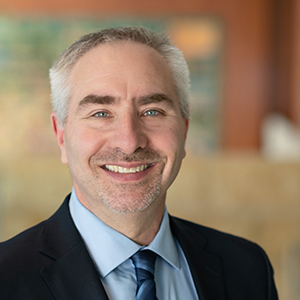
Ron Feldman
First Vice President and Chief Operating Officer
Federal Reserve Bank of Minneapolis
Ron Feldman is first vice president and chief operating officer of the Federal Reserve Bank of Minneapolis. In this role, he leads all Bank operations, including payment and financial services, fiscal agent responsibilities, and a variety of shared services for the entire Federal Reserve System. He also is responsible for finance and budgeting, strategic planning, workforce and talent development, and performance against strategic objectives.
He has led a variety of high-priority Federal Reserve System operational and policy initiatives involving the budget and key operations for all Federal Reserve Banks, including Federal Reserve monetary policy implementation and central bank lending. Feldman chaired the Federal Reserve Chief Operating Officer council, which oversees all Reserve Bank and national business line operations.
He is also a primary advisor on monetary policy, playing a leadership role in preparing the Bank president for Federal Open Market Committee meetings and in the development and communication of positions on monetary policy.
An expert on financial institutions and related government policies, Feldman has authored more than 50 articles on topics related to banking, finance, and monetary policy. He is one of the foremost authorities on the too-big-to-fail problem, co-authoring Too Big to Fail: The Hazards of Bank Bailouts, published by the Brookings Institution (2004).
Since joining the Bank in 1995, Feldman has served as a senior officer for Supervision, Regulation, and Credit and has run the Financial Services Support Office, which assists in the oversight of the Federal Reserve’s financial services.
He has a B.A. with distinction from the University of Wisconsin and an M.P.A. from the Maxwell School, Syracuse University, where he was a university fellow. He is a fellow of the National Academy of Public Administration.
Feldman is an active community member, serving on the Mpls Downtown Council board of directors, the Itasca Project leadership council, and Beth El Synagogue’s board of directors. He is also on the board of visitors for the University of Wisconsin–Madison History Department.

Leonard “Lenny” Fineday
Leech Lake Band of Ojibwe
Secretary/Treasurer
Leech Lake Band of Ojibwe
A licensed attorney, Leonard “Lenny” Fineday has served in Indian Country for almost 20 years in various capacities including as a tribal attorney, general counsel, and tribal court judge. In June 2022 he was elected to the position of secretary/treasurer for the Leech Lake Band of Ojibwe Business Committee. He also currently serves as a member of the Cass Lake-Bena School Board.
Fineday’s past leadership experience includes serving as the president of the Minnesota American Indian Bar Association, a member of the Cass Lake City Council, and a trustee for the Leech Lake Tribal College.
Fineday is an enrolled member of the Leech Lake Band of Ojibwe. He was born and raised in Cass Lake, Minnesota, on the Leech Lake Reservation.

Dennis Fitzpatrick
Blackfeet Tribal Nation
CEO
Siyeh Corporation, Blackfeet Tribal Nation
Dennis Fitzpatrick is CEO of Siyeh Corporation, a federally chartered, tribally owned corporation designed to manage businesses on behalf of the government. Named after a great Blackfeet warrior known for his fearless leadership, the Siyeh Corporation today runs multiple businesses, including a telecommunications/broadband utility, a cable television company, a heritage center, an art gallery, and two casinos.
Fitzpatrick has served as CEO of Siyeh for over 20 years. Prior to joining the company in 1999, he practiced law as a tribal attorney for the Blackfeet Tribe. He has a demonstrated history of developing and managing tribal enterprises.

Phil Gover
Northern and Southern Paiute, Pawnee, and Comanche Nations
Senior Policy Analyst
CICD, Federal Reserve Bank of Minneapolis
Phil Gover is a senior policy analyst for the Minneapolis Fed’s Center for Indian Country Development, where he is a leader of the Survey of Native Nations and provides research and expertise on tribal government credit needs and community development finance opportunities in Indian Country, especially those related to the Community Reinvestment Act.
Gover has worked in and around Indian Country for more than 20 years, serving in a variety of project management capacities and spending more than a decade in the education sector. Gover is also chairman of the board of directors of Multiplier, a California-based nonprofit and social entrepreneurship incubator and accelerator.
Gover holds a B.A. in political and social thought from the University of Virginia and an MBA in strategy and operations from the University of Virginia’s Darden School of Business. He is an enrolled member of the Cedar Band of Utah Paiutes, grew up on the Hungry Valley Reservation at the Reno-Sparks Indian Colony, and descends from the Comanche and Pawnee Nations.

Chairman Gerald Gray
Little Shell Tribe of Chippewa Indians
Little Shell Tribe of Chippewa Indians
Gerald Gray serves as chairman of the Rocky Mountain Tribal Leaders Council, which serves 12 tribes in the Rocky Mountain region. He is also a commissioner on the Montana State Tribal Economic Development Commission and the elected chairman of the Little Shell Tribe of Montana, which he has served since 2012. Chairman Gray oversees tribal programs and economic opportunities for the tribe. He also maintains government-to-government relationships with city, county, state, and federal governments on behalf of the tribe’s 5,400 members.
For 20 years, he built a reputation as a leader in market research and media development for G&G Advertising, where he worked on state, regional, and national campaigns promoting behavioral change on health-related issues. Earlier in his career, Chairman Gray served in a teaching position with the Box Elder Public School System. In that role, he developed and delivered a general education curriculum inclusive of all students and learning styles and supported a parent-to-teacher system encouraging parent involvement in their children’s education.

Dawson Her Many Horses
Rosebud Sioux Tribe of South Dakota
Managing Director
Wells Fargo
Dawson Her Many Horses is a managing director at Wells Fargo, which is the leading provider of capital and financial services to the Native American and Alaska Native markets. Wells Fargo has relationships with more than 400 tribes and tribally owned enterprises, with approximately $2.5 billion in credit commitments and $2.5 billion in deposits. After joining Wells Fargo in 2018, he was appointed head of Native American Banking in 2021 before being named a managing director in 2023.
Her Many Horses’ career has spanned commercial and investment banking, with a focus on Native American gaming. He began his career at Merrill Lynch after graduating from Columbia University in 2004. Her Many Horses was appointed director of Native American business development for the investment banking, wealth management, and asset management groups at Merrill Lynch. He later moved into Merrill Lynch investment banking, where he focused on the tribal gaming market. Her Many Horses received his MBA from Dartmouth College in 2010 and rejoined Bank of America Merrill Lynch, where he was a banker on the Gaming team until 2018.
Her Many Horses is the founder of the Native American employee group at Bank of America and is chair of the Native American Visiting Committee at Dartmouth College. He is an enrolled member of the Rosebud Sioux Tribe of South Dakota.
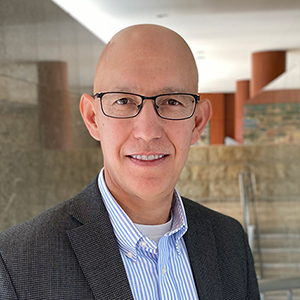
Andrew Huff
Chippewa Cree Tribe
Senior Policy and Legal Advisor
CICD, Federal Reserve Bank of Minneapolis
Andrew Huff is the senior policy and legal advisor to CICD. He is an enrolled member of the Rocky Boy’s Reservation of north-central Montana. He graduated from Harvard College in 1991 and the University of Colorado Law School in 1999.
Over the course of his legal career, Huff has served in a variety of positions, including as a tribal judge for the Rocky Boy’s Indian Reservation; as chief legal counsel to Governor Steve Bullock of Montana (2013–2017); and as an assistant attorney general for the Montana Department of Justice (2010–2012).

Chris James
Cherokee
President and CEO
The National Center for American Indian Enterprise Development
Chris James is president and CEO of The National Center for American Indian Enterprise Development, which he has guided into its sixth decade. Under his leadership, The National Center has more than doubled its annual revenue, expanded its national footprint, and grown its staff. In addition to hosting the annual Reservation Economic Summit (RES), The National Center has implemented the Native Edge Institute series of one-day training sessions designed to give established and emerging entrepreneurs the tools they need to take their next step. Under James’ leadership, The National Center has an increased focus on international trade, in particular Indigenous-to-Indigenous trade. The organization also serves as a connector between corporate America and Native-owned businesses seeking to enter their supply chains.
James is an expert on the Indigenous economy, Native American policy, and economic development, particularly in rural and disadvantaged communities. As a former senior official at the U.S. Department of the Treasury and Small Business Administration (SBA), he has expertise in government contracting, supply chains, underserved markets, Community Development Financial Institutions and access to capital, and small business issues.
James has served on numerous boards and leadership committees, including with the SBA, Federal Communications Commission, World Trade Organization, Center for Indian Country Development, Junior Achievement USA, and First Peoples Worldwide. He is a frequently requested speaker, panelist, and moderator and has testified on Native American and Alaska Native policy before Congress.

Nancy Jordan
Executive Director, Capacity Developer, Success Coach
Pacific Northwest Tribal Lending
Nancy Jordan is the executive director of Pacific Northwest Tribal Lending. Her journey began on her family farm, where she learned the values of hard work, resilience, and connection to the land. From there, Jordan began her career as an agricultural commercial lender and appraiser, setting the stage for a lifetime dedicated to financial empowerment and community development.
As co-owner of Sound Wise Studios Inc., a small family business, Jordan has navigated the spectrum of entrepreneurial challenges—from start-up to expansion and contraction—while building capacity and mentoring future leaders along the way. Jordan is committed to strengthening leadership capacity and fostering environments where community and business thrive.
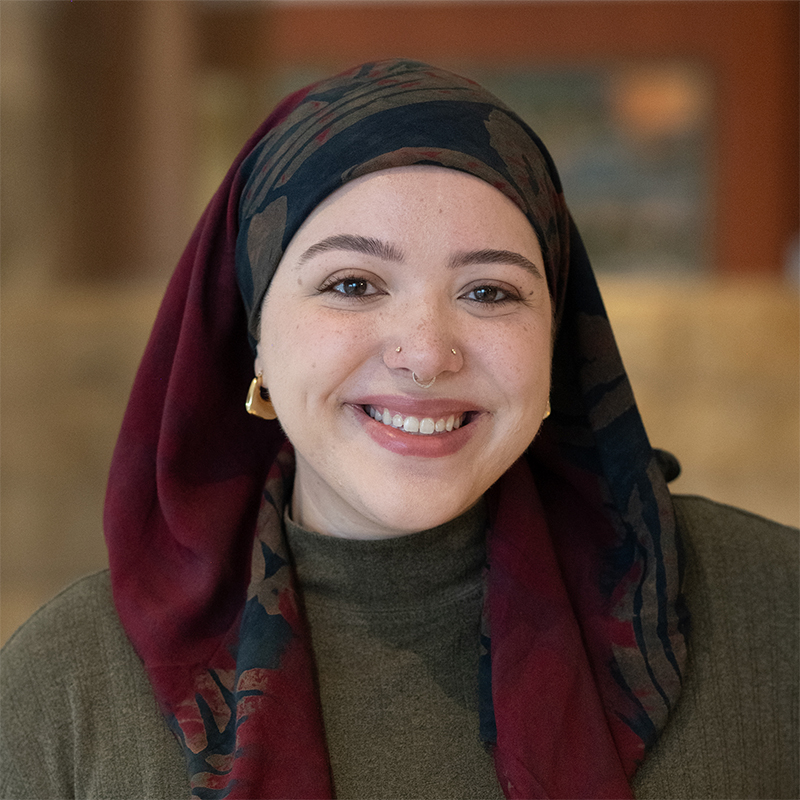
Amalea Jubara
Research Assistant
CICD, Federal Reserve Bank of Minneapolis
Amalea Jubara is a research assistant for the Minneapolis Fed’s Center for Indian Country Development (CICD), where she contributes to CICD’s research and policy work by compiling data, conducting analysis, and developing data tools that advance the economic self-determination and prosperity of Native nations and Indigenous communities.
Before joining the Bank in 2023, Jubara received her Bachelor of Science in economics and public policy from St. Catherine University. She has held a range of research assistant positions and fellowships in the fields of economics, policy, and sociology.
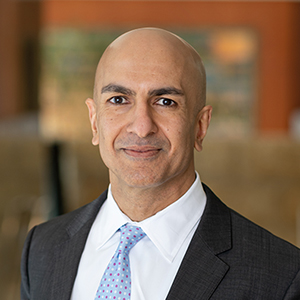
Neel Kashkari
President and CEO
Federal Reserve Bank of Minneapolis
Neel Kashkari took office as president and CEO of the Federal Reserve Bank of Minneapolis on January 1, 2016, following a national search conducted by the Bank’s independent board of directors.
In this role, he serves as a member on the Federal Open Market Committee, bringing the Ninth District’s perspective to monetary policy discussions in Washington, D.C. In addition to his responsibilities as a monetary policymaker, Kashkari oversees all operations of the Bank, including supervision and regulation, Treasury services, and payments services.
Kashkari leads the Bank’s many initiatives. He was instrumental in establishing the Opportunity & Inclusive Growth Institute, whose mission is to ensure that world-class research helps to improve the economic well-being of all Americans.
Most recently, he’s supported the expansion of the Center for Indian Country Development, which advances the prosperity of Native nations and Indigenous communities through actionable data and research.
Under Kashkari’s leadership, the Minneapolis Fed also released an action plan on ending too big to fail, which calls for tighter bank regulations to avoid future taxpayer bailouts of large financial institutions. Committed to increasing transparency at the Fed, Kashkari has published in the Wall Street Journal, Washington Post, and Financial Times and is active on social media. He serves on the boards of the Economic Club of Minnesota and the Northside Achievement Zone and is a member of the Aspen Economic Strategy Group.
Kashkari began his career as an aerospace engineer at TRW (now Northrop Grumman) in Redondo Beach, California, where he developed technology for NASA space science missions. Following graduate school, he joined Goldman Sachs in San Francisco, where he helped technology companies raise capital and pursue strategic transactions.
From 2006 to 2009, Kashkari served in several senior positions at the U.S. Department of the Treasury. In 2008, he was confirmed as assistant secretary of the Treasury. In this role, he oversaw the Troubled Asset Relief Program (TARP) during the financial crisis. Kashkari received the Alexander Hamilton Award, the Treasury Department’s highest honor for distinguished service. Following his tenure in Washington, Kashkari returned to California in 2009 and joined PIMCO as managing director and member of the executive office. He left the firm in 2013 to explore returning to public service and, in 2014, ran for governor of California on a platform focused on economic opportunity.
Raised in Ohio, Kashkari earned bachelor’s and master’s degrees in mechanical engineering at the University of Illinois at Urbana-Champaign and an MBA from the Wharton School of the University of Pennsylvania.

Michou Kokodoko
Senior Policy Analyst
Federal Reserve Bank of Minneapolis
Michou Kokodoko is a project director in the Minneapolis Fed’s Community Development and Engagement department. He leads the Bank’s efforts to promote effective community-bank partnerships by increasing awareness of community development trends and investment opportunities, especially those related to the Community Reinvestment Act.
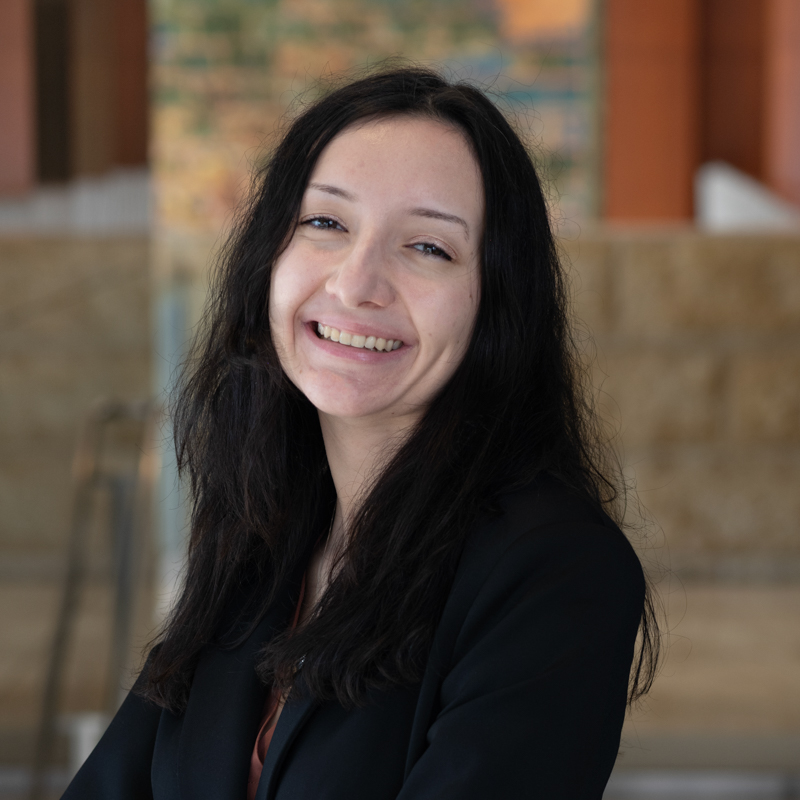
Ava LaPlante
Santo Domingo Pueblo
Research Assistant
CICD, Federal Reserve Bank of Minneapolis
Ava LaPlante is a research assistant for the Minneapolis Fed’s Center for Indian Country Development (CICD), where she contributes to CICD’s research and policy work by compiling data, conducting analysis, and developing data tools that advance the economic self-determination and prosperity of Native nations and Indigenous communities. LaPlante started with CICD as an intern while she completed her bachelor’s degree in economics and public policy from St. Catherine University. In 2022, she was a scholar in the American Economic Association’s Summer Program.
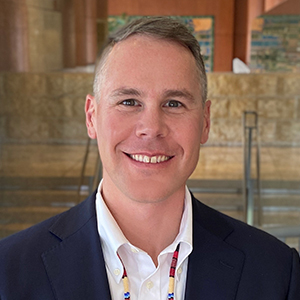
Casey Lozar
Confederated Salish and Kootenai Tribes
Vice President, Director of CICD
Federal Reserve Bank of Minneapolis
Casey Lozar is a vice president at the Federal Reserve Bank of Minneapolis and director of the Center for Indian Country Development (CICD), a research and policy institute that works to advance the economic self-determination and prosperity of Native nations and Indigenous communities.
Before assuming leadership of CICD, Lozar was assistant vice president/outreach executive in the Bank’s department of Public Affairs, and the leader of our Helena Branch.
Prior to joining the Minneapolis Fed in 2018, Lozar served in economic development and higher education roles for the State of Montana. Additionally, he held executive leadership positions in national Native American nonprofits, including the American Indian College Fund and the Notah Begay III Foundation.
Lozar received degrees from Dartmouth College and Harvard University and an MBA from the University of Colorado-Denver.
Lozar is the 2021 recipient of the Janet L. Yellen Award for Excellence in Community Development and a 2022 recipient of the Honorary Leadership Award from the Native American Finance Officers Association.
A Montana native, Lozar was raised on the Flathead Indian Reservation and is an enrolled member of the Confederated Salish and Kootenai Tribes.

Mary Mashunkashey
Osage, Pawnee
Tax Commissioner
Office of the Tax Commission, Muscogee Creek Nation
Mary Mashunkashey is the tax commissioner for the Muscogee Creek Nation. She has been in the tribal tax field for more than 25 years, working for the Osage Nation for 16 years; the Mandan, Hidatsa, and Arikara Nation for two years; the Seminole Nation of Oklahoma for five years; and the Muscogee Nation for the past five years. She is the former president and founder of the Oklahoma Intertribal Tax Association and chair and co-founder of the National Intertribal Tax Alliance. Mashunkashey has been a speaker at many events, including giving keynote addresses, and recognized for her leadership.

Robert Maxim
Mashpee Wampanoag Tribe
Fellow
Brookings Metro
Robert Maxim is a fellow at Brookings Metro. Maxim conducts research and designs policy proposals exploring how technological change and other economic trends affect people and places. His recent work has focused on measuring federal investments into place-based industrial policy, developing more inclusive state innovation economies, broadening access to highly digital employment, and supporting the missions of regional public universities.
Maxim is an enrolled citizen of the Mashpee Wampanoag Tribe and leads Brookings Metro’s research around Native American communities. His research has focused on the inclusion of Native Americans in U.S. federal government datasets, as well as how federal data represent Native American identity. He has also conducted research on Native Americans’ access to the remote work economy and the role of Native American Community Development Financial Institutions in tribal economies. Within Brookings, he has led efforts to resurface the Institution’s historic engagement in tribal communities, including the landmark 1928 Meriam Report, and to engage with Native-led organizations on enabling future research centering Native American people.
Maxim has also written about the effects of automation and artificial intelligence on U.S. workers, ways to encourage economic growth and inclusion in U.S. heartland states, the geography of the COVID-19 recession, the gig economy and contingent work, and the effects of U.S. tariffs and trade policy.

Alisha L. Murphy
Diné/Navajo
Economist
Navajo Nation Division of Economic Development
Alisha L. Murphy (Diné/Navajo) currently works at the Navajo Nation Division of Economic Development as the tribe’s first Diné economist. With over a decade of experience in tribal economic development, Murphy brings a robust academic background, holding a Master of Social Work from Washington University in St. Louis and a Master of Economics and Doctor of Economic Development from New Mexico State University. In her doctoral program, Murphy focused on Navajo entrepreneurship and economic growth.
In addition to her role with the Navajo Nation, Murphy is vice chair of the board of directors for the Global Centre of Indigenomics, where she supports Indigenous entrepreneurship on a global scale. Her accomplishments earned her the 2021 Native American 40 Under 40 recognition from the National Center for American Indian Enterprise Development. Murphy’s research and advocacy emphasize advancing tribal economic development and data sovereignty. Her work is grounded in a commitment to empowering tribal communities through data-driven leadership and sustainable, community-focused development.

Casey Pearlman
Inupiaq
Executive Director
Affiliated Tribes of Northwest Indians Economic Development Corporation
Casey Pearlman, Inupiaq and mixed settler descent, is the executive director of the Affiliated Tribes of Northwest Indians Economic Development Corporation (ATNI-EDC). In this role, Pearlman oversees the economic development division, financial services, and the Northwest Native Lending Network from the organization’s headquarters in Portland, Oregon. She is a member of the first wave of the Rematriating Economies Apprenticeship, the board treasurer for Underscore Native News, and a board member for the Center for Inclusive Entrepreneurship.
Pearlman graduated from Portland State University with a Bachelor of Arts in business management and human resource management and has 10 years in Portland’s startup industry. She identifies as an “entrepreneur enthusiast” and works to serve Native businesses and grow economic prosperity across Indian Country.

Reid Raymond
Rosebud Sioux Tribe
Community Member
Reid S. Raymond attributes learning the way of life of his father’s people, the Lakota and Dakota, to having had good teachers, including friend and mentor Reuben A. Snake who taught him about spirituality and traditions when he was a young man.
Since 1992, Raymond has served as an assistant Hennepin County attorney. While serving as president of the Minnesota Native American Bar Association, Raymond helped create a scholarship for Native law students attending Minnesota’s law schools. He is also the vice chair of the board of the Tiwahe Foundation, a Native-controlled community foundation.
Before becoming an attorney, Raymond worked and volunteered in his local Native community, including cofounding MIGIZI Communications, serving as president of Little Earth of United Tribes, and chairing the University of Minnesota American Indian Advisory Committee.
He is a veteran of the United States Army and holds undergraduate degrees in broadcast journalism and American Indian studies and a J.D. from the University of Minnesota. Raymond is a citizen of the Rosebud Sioux Tribe of South Dakota.

Zacheriah Red Bear
Cheyenne River Sioux Tribe
Community Member
Zacheriah Red Bear is an enrolled member of the Cheyenne River Sioux Tribe in South Dakota and currently resides in Imnížaska Othúŋwe (Saint Paul). For most of his life, he has performed traditional grass dancing and drum songs.
Red Bear is employed at the Ain Dah Yung Center as a chemical health advocate and drum keeper. He teaches grass dancing and shares powwow teachings with communities in the Twin Cities.

Kip Ritchie
Forest County Potawatomi
Chief Executive Officer
Potawatomi Ventures
Kip Ritchie is an enrolled Forest County Potawatomi tribal member and serves as Chief Executive Officer (CEO) of Potawatomi Ventures. Prior to being promoted to CEO, Ritchie served as both the Chief Operations Officer of Potawatomi Ventures and the president of Greenfire Management Services LLC. He joined Potawatomi Ventures full-time in 2006 as senior vice president and served on its founding board of directors from 2002–2007. Ritchie’s career in Indian Country began in 1997 when he joined Potawatomi Casino Hotel as director of marketing. He was promoted to assistant general manager in 2002.
Ritchie serves on the following boards: National Center for American Indian Enterprise Development, Froedtert Hospital Foundation, Wisconsin Women’s Business Initiative Corporation, and Gun Lake Investments, the economic development arm of the Gun Lake Tribe. He is also a member of the U.S. Department of Commerce Minority Business Enterprises Advisory Council. Since 1999, he has served as the chairman of the Forest County Potawatomi Foundation’s board of directors.
Ritchie is a graduate of the University of Wisconsin–Madison with a bachelor’s degree in communication.

Joel Rosette
Chippewa Cree Tribe
CEO
Rocky Boy Health Center
Joel Rosette, an enrolled member of the Chippewa Cree Tribe, serves as CEO of the Rocky Boy Health Center in Box Elder, Montana. He leads a team of more than 200 employees that administers health and wellness services on the Rocky Boy’s Indian Reservation and to surrounding communities.
Throughout his career, Rosette has committed himself to the cause of serving tribal nations, including a focus on advancing the interests, welfare, and aspirations of tribes and tribal members. Rosette has also served as a mentor and coach, guiding and empowering young tribal members.
Rosette attained his bachelor’s degree in business administration, focusing on management and marketing, from the University of Montana. He obtained his J.D. at the University of New Mexico School of Law, specializing in Indian law. Rosette is a member of the State Bars of Montana and Washington and the Fort Belknap Tribal Bar. He is the owner of Joel Rosette Law PLLC, a tribal law practice representing tribal firms and entities, and MTN Leadership LLC, with a focus on leadership training and development.

Amber Schulz-Oliver
Yakama/Wasco
Executive Director
Affiliated Tribes of Northwest Indians
Amber Schulz-Oliver (Yakama/Wasco) is the executive director of the Affiliated Tribes of Northwest Indians (ATNI) and has established firm roots in Portland, Oregon. ATNI is an organization dedicated to promoting tribal self-determination and sovereignty and serves 57 tribal nations in the Pacific Northwest.
Schulz-Oliver previously served as executive director of the ATNI Economic Development Corporation and its subsidiary Community Development Financial Institution (CDFI), ATNI Financial Services.
Schulz-Oliver received a Bachelor of Arts from Oberlin College and a Master of Business Administration from Willamette University. She serves on the boards of several organizations, including the Potlatch Fund, Nch’i Wana Housing, Ecotrust Community Development Entity, and Ecotrust Investments. She is committed to environmental stewardship, sustainability, and service to the Native community.

Tralynna Sherrill Scott
Cherokee Nation
Chief Economist
Cherokee Nation Businesses
Tralynna Sherrill Scott, citizen of the Cherokee Nation, is Cherokee Nation Businesses’ chief economist. She also serves as the Cherokee Nation’s special envoy to the U.S. Department of the Treasury.
Prior to assuming her role as chief economist at Cherokee Nation Businesses, Scott served as treasurer and chief financial officer of the Cherokee Nation. As treasurer, she was responsible for the $3 billion annual budget of the Cherokee Nation, including federal COVID-19 relief funding under the CARES Act and the American Rescue Plan Act. Scott has worked for the Cherokee Nation for nearly 19 years and held various positions in addition to those mentioned above, including financial analyst, investment analyst, attorney, and director of corporate taxation.
Scott also serves on the board of directors for the Oklahoma Tribal Finance Consortium, Oklahoma State University Tribal Finance and Accounting program, and American Red Cross of Northeast Oklahoma.
Scott earned her Juris Doctor and master’s degree in taxation from the University of Tulsa. She earned a Bachelor of Business Administration with a major in accounting from the University of Notre Dame.

Senator Tina Smith U.S. Senate (MN)
Senator Tina Smith has proudly represented Minnesota in the U.S. Senate since 2018. She serves on both the Banking Committee and the Indian Affairs Committee, where she is a leader on Native housing and economic development. In all her work, Senator Smith works to make sure that the needs and sovereignty of tribal nations and Native communities are at the forefront in federal policymaking.
Since coming to office, Senator Smith has passed more than 70 bills and provisions into law. These include advancements to end violence against women, measures to improve health care and public safety, investments in infrastructure and broadband, expanding workforce training and education, supporting farmers and ranchers, and securing resources for housing and economic development.

Alene Tchourumoff
Senior Vice President, Talent and Engagement, Learning Management Support Office, and Community Development and Engagement
Federal Reserve Bank of Minneapolis
Alene Tchourumoff serves as senior vice president leading three divisions: Talent and Engagement, the Learning Management Support Office, and Community Development and Engagement, which includes the Center for Indian Country Development. In these roles she leads the Bank’s internal human resources as well as the Bank’s external engagement with communities throughout the Ninth District, with an emphasis on low- and moderate-income people and those living in Indian Country.
Prior to joining the Bank in December 2018, Tchourumoff served as chair of Minnesota’s Metropolitan Council, where she built strong partnerships with local governments and community groups to advance transit, housing, and other critical infrastructure. She has also held leadership roles in the executive branch of the State of Minnesota and Hennepin County.
Tchourumoff holds a bachelor’s degree in business administration from George Washington University School of Business and a master’s degree in public policy from Harvard University’s Kennedy School of Government.
Tchourumoff was named a 2020 Women in Business honoree by the Minneapolis/St. Paul Business Journal and is a member of the Minneapolis Foundation Board and a trustee of the Minnesota Science Museum.

ANNIVERSARY ARTWORK
CICD’s tenth-anniversary artwork was created by Rachel Twoteeth-Pichardo, a Chippewa Cree and Pend d’Oreille multimedia artist. Twoteeth-Pichardo designed the piece as digital ledger art, a modern version of a traditional form of Native American artwork.
Beginning in the late 1800s, Plains tribes used ledger art to document and preserve their histories. Reusing ledger books as canvas, artists drew and painted illustrations of life at the time. CICD’s tenth-anniversary artwork features digital illustrations rendered on an image of an actual balance sheet from the Federal Reserve Bank of Minneapolis’ Helena branch dated November 2, 1921—a period marked by legislative efforts to advance recognition of Native American rights and improve Native American living conditions.
In the center of the artwork, a grandmother braids her granddaughter’s hair, representing CICD’s anniversary event theme of braiding the past and future of Native economies. The grandmother wears traditional clothing and the granddaughter more modern clothing, with continuity in cultural references carried through the details of their attire. Stickers on the granddaughter’s laptop include a teepee representing Indian Country history, a chart representing data work, and an eagle representing the Federal Reserve System and a sacred animal in Native cultures. This relationship at the heart of the artwork reminds us that research and data work on behalf of Indian Country economic prosperity is, ultimately, about the people in the economy.
Moving from left to right, the imagery transitions from a traditional to a modern economy. In the lower left, a teepee pays homage to housing historically associated with the Plains Indians of the Ninth Federal Reserve District. Next, buffalo as well as corns, beans, and squash—the “three sisters”—represent traditional resources with enduring cultural significance to many tribes.
As the image moves toward a modern economy, we see tribal housing with solar panels on the roof followed by a contemporary tribal headquarters modeled after that of the Confederated Salish and Kootenai Tribes in Montana. In the lower right corner, a bank represents one of the institutions vital to modern economies.
As a backdrop, the sun connotes the cyclical nature of life and continuity from past to future. Braided sweetgrass outlines the image, honoring traditional ways of knowing. In ceremonies, sweetgrass is considered a sacred medicine that invites healing and positivity. The sweetgrass outline and blue base might also be interpreted as denoting earth and water.
At the bottom of the artwork, berries and a floral design depict additional culturally significant imagery and reflect hallmarks of the artist. The artwork also incorporates what are considered sacred colors in Native cultures symbolizing wisdom about nature and life.
